A report by Al-Akhbar today unveiled details about the Swiss legal proceedings against Lebanon's Central Bank Governor Riad Salameh.
Swiss authorities continue to investigate Riad Salameh, who, along with his brother, is suspected of embezzling and laundering funds amounting to $300 million. Salameh founded several companies and opened accounts in Switzerland, while there were also "suspicious" contracts signed between his brother and the Central Bank of Lebanon. The Swiss public prosecutor's office has disclosed these details to Lebanese authorities, seeking their cooperation due to concerns that this could impact the "Republic" and the central bank.
In January, Governor Riad Salameh was placed under the scrutiny of the Swiss judiciary. He, alongside his brother Raja Salameh, is suspected of embezzling funds from the Central Bank of Lebanon and laundering them in Switzerland. The investigation into "corruption" involving a central bank governor is significant as it compromises the bank's image and its relationships with other global financial institutions. Salameh indicated to some close regulatory officials that he believed the "American cover" he had was lifted. Following this, discussions about the case tapered off, leading to suggestions that it might conclude with a settlement. However, the halt in public discussions about the case doesn’t indicate an end to it. On the contrary, Swiss judicial and diplomatic sources confirmed to Al-Akhbar that "investigations are ongoing seriously."
Preliminary investigations reveal money laundering operations dating back at least to 2002, amounting to over $300 million. The linchpin of the investigation is a contract signed between the Central Bank of Lebanon, represented by the governor, and Forry Associates LTD, represented by Raja Salameh, which is registered in the British Virgin Islands. The contract states that "the company is the agent for tools provided by the Central Bank of Lebanon, such as treasury bonds, foreign currency debts, and certificates of deposit…". Herein lies the violation: Salameh, in his capacity as governor, entered into a long-term deal with a company led by his brother, securing profits for the latter from the public funds of the Central Bank. Expenditures related to the central bank and this company were transferred to an account at HSBC Switzerland, belonging to Raja Salameh. Between 2002 and 2015, approximately $334 million was transferred to Forry Associates LTD from a single account at the Central Bank, sources noted. Funds were also sent to Raja Salameh's account at HSBC Switzerland, which forwarded $207 million to five banks within Lebanon.
In 2008, a new account emerged at Julius Baer bank in Switzerland under the name of Westlake Commercial Inc, registered in Panama. This account is registered in the name of Riad Salameh. "Documents we obtained from the relevant banks indicate that the new account at Julius Baer received over $7 million between 2008 and 2012, transferred from the account of Forry Associates." That year also saw "Salameh opening a bank account in the name of the Central Bank at Julius Baer, which he exclusively controls, and he instructed the bank to transfer financial bonds in 2012 to Bank Audi in Switzerland."
In 2011, another company registered in Riad Salameh's name, SI 2 SA, opened a bank account at EFG Bank in Switzerland, which Westlake Commercial Inc transferred 1.6 million Swiss francs to. Between 2011 and 2013, approximately 3 million Swiss francs were transferred to SI 2 SA before the company paid 7.3 million Swiss francs to Red Street 10 SA in 2019. The bank account belongs to Riad Salameh. In addition to the accounts of his three companies—RED STREET 10 SA, SI 2 SA, and Westlake Commercial Inc—the governor owned an account at UBS AG that received a total of $7.5 million from 2012 to 2018, all transferred from accounts at the Central Bank. Swiss sources added that Salameh "opened an account in his name at Credit Suisse in 2016, which received over $4 million between 2016 and 2019 from an account he owned at the Central Bank." He then transferred over $5 million from his account at the Central Bank to an account at Pictet CIE SA. All these funds were "invested in purchasing properties and bonds." It is worth noting that Salameh is a public employee receiving his salary in Lebanese pounds, and his transfers abroad in dollars were either by purchasing dollars from the "market" or from deposits at banks, meaning the money of depositors.
Lebanon must decide whether to confiscate the funds held in Switzerland. But what is Marian Hweik's role? Sources respond that the governor's assistant "owns two bank accounts, to which she made financial transfers between 2008 and 2013." The accounts held by Hweik, along with Salameh's accounts, "were frozen after the case opened. Salameh's assets in Switzerland are estimated in the tens of millions of dollars." However, Swiss authorities have not established "suspicion" against Hweik, and they want to interview her as an individual in a position that qualifies her to provide "useful information for the investigation, based on which she could either be a mere witness or a suspect." In contrast, the questioning of the Salameh brothers "will take place as suspects."
A key aspect of this case is examining how decisions are made within the Central Bank of Lebanon, the authority of the governor, his unilateral decision-making in specific matters, his misuse of his position to conduct private transactions, transferring funds, among others... Is the interrogation taking place in Switzerland? Riad Salameh expressed a willingness to do so, "but it is not necessary; investigations can take place in Switzerland, and they can also be conducted in Lebanon according to either Swiss or Lebanese law."
What is required now? Swiss sources consider cooperation from Lebanese authorities a critical step, "especially to determine whether the crimes harm Lebanon and the Central Bank of Lebanon as an entity, and it is also necessary for Lebanon to clarify whether it wants to confiscate the funds held in Switzerland."




